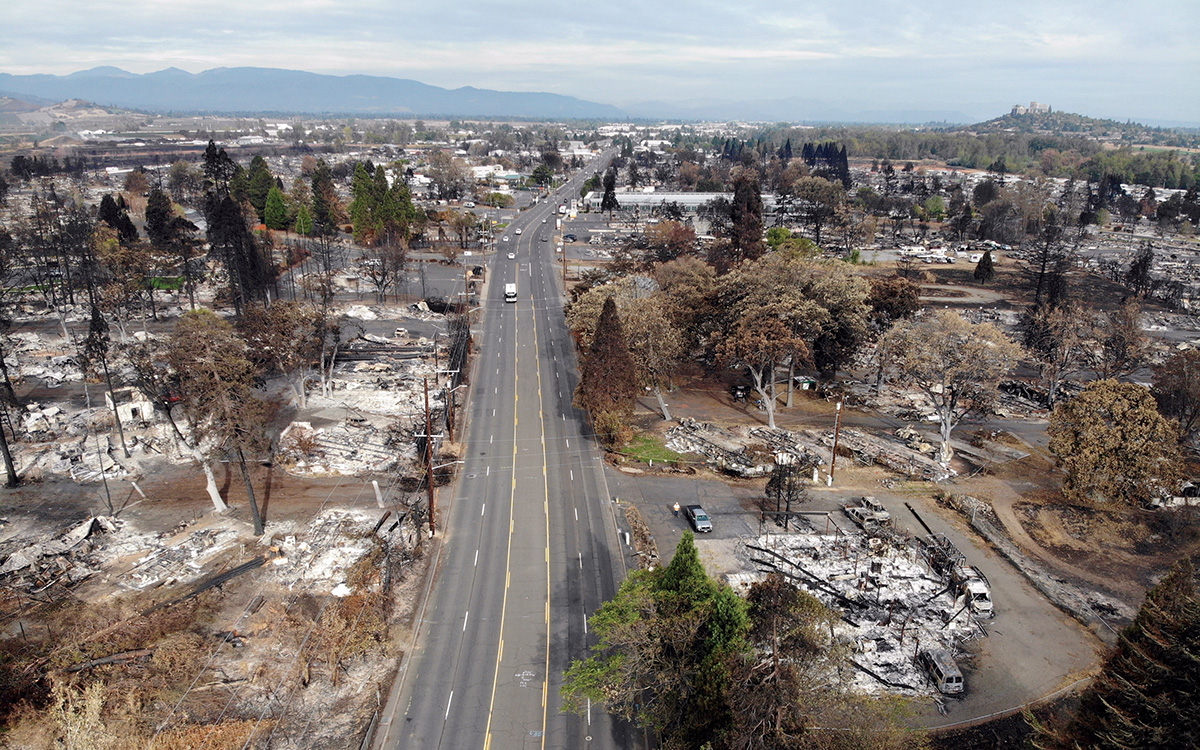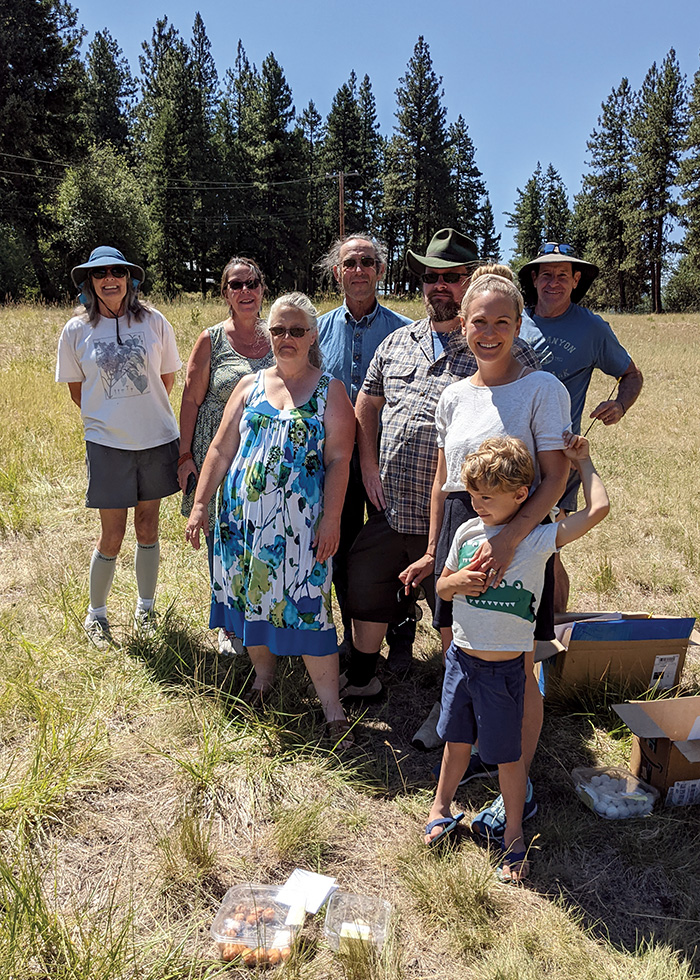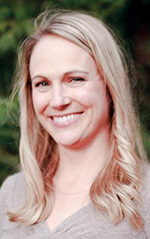Consular Skills Put to Use in Rural America
Working remotely in the United States offers opportunities to help U.S. communities and raise public awareness about diplomacy and the Foreign Service.
BY SARAH WARDWELL

The aftermath of the Almeda fire as seen from Coleman Creek, Oregon, in September 2020.
Oregon Department of Transportation
Last summer I lay awake at night with the windows open, my cell phone next to my bed, go-bags packed next to the front door and our car ready with emergency supplies. We came to rural southern Oregon to the town of Ashland, where my husband grew up, while on authorized departure in March 2020 because of COVID-19. I had switched into a remote work agreement after a few months, staying in the idyllic mountains and seemingly safe from the pandemic, and working on communicating about leadership and management for the Bureau of Consular Affairs.
What we weren’t safe from in Ashland was natural disasters. At one point we were surrounded by three wildfires, and a fire ripped through our town after jumping across the freeway. My nerves were already a little fried after leaving the Dominican Republic in 72 hours, having friends oversee the packout while sending little text updates or short video chats—just trying to remember what we’d left in each room and hoping not too much would be lost in the packout was really stressful. On top of that, starting a new job virtually and being several months into the pandemic, I felt like we were stuck in fight-or-flight mode.
Thankfully, the fall brought rain and the fire danger seemed to subside. Then one day neighbors plastered our mailboxes with a call for an outdoor, physically distanced community meeting. I attended, notebook in hand. What I heard was a community grappling with how to better communicate during emergencies. I immediately realized that my experience overseas, as a consular officer, working with NGOs and in the Peace Corps could help here.
I’m sharing this story because it exemplifies how Foreign Service consular skills can be useful at home in U.S. communities.
Putting Consular Skills to Work at Home

Sarah Wardwell (front right) with the Greensprings Emergency Network (GEN) during their first radio training, July 2021.
Courtesy of Sarah Wardwell
Fires are going to be a part of life for this mountain community, which is mostly supported by a volunteer fire department and a fire department coming from the main town, more than 20 minutes away up narrow, windy mountain roads. I suggested we set up a system like the citizen liaison volunteer networks that consular sections coordinate overseas. The community was thankful for a suggestion that was low-cost and could be set up easily using my expertise.
We got right to work. During the meeting, I had sent around a sign-up sheet to establish a working group. We began holding biweekly virtual meetings on weekends to discuss how to set up the program. I used the project management tools offered by 1CA, the office where I manage communications for my day job. Community members were so impressed with these tools and being able to directly reap the benefits of their tax dollars.
With the help of a local internet service provider, the Greensprings Internet Co-Op, we began testing out radios as a means to contact each other in the event of an emergency. This community faces unique communication challenges: Some people live completely off-grid with no phones; others have no cell phone reception due to their location. Many are older and simply don’t keep their cell phones near them or look for alerts. Radios were a simple solution, as they often are when we’re overseas. We found funding from a local community organization to cover the costs of setting up the radio network and to provide radios to interested individuals who couldn’t afford to purchase their own. The system is now up and running for its first fire season, a true trial by fire!
The new radio network can help residents cope with the dangers of fire season for many years after I’ve left the mountain, protecting homes and businesses, and providing an income source for the radio technicians: It was an effective domestic application of my consular skills.
I’m regularly asked to explain what the State Department does and, of course, fielding questions about consular services.
But it also accomplished something more. Most of the community where I’m living has never heard of the State Department or the U.S. Foreign Service. When I tell people what I do for a living, it is often confused with the “Forest Service” or the “Oregon Department of State.” When a little girl at my son’s two-room schoolhouse told me she wanted to be president one day, I told her about my work in the executive branch—that brought her closer to D.C. than she or her family had ever been. I’ve also been able to attend academic presentations for graduates of the local university and mentor students who are interested in joining the Foreign Service, all of which leads to a diversity of ideas in Foreign Service.
Shopping at the local co-op, supporting local agriculture and businesses, is good for my local community and an extended benefit of my assignment here. I’m also exposed to different ideas by working in southern Oregon as opposed to D.C. I listen to a different set of ideas and concerns from my neighbors, often on topics of foreign policy. I practice my diplomacy skills constantly, because I’m regularly asked to explain what the State Department does and, of course, fielding questions about consular services.
Among other benefits of working remotely from Oregon for the State Department are expanding Americans’ awareness and understanding of the Foreign Service, helping create new pipelines of interested candidates, supporting the FS family of the officer, and making for easy access to colleagues working around the world in different time zones. As a March 2021 report from the Truman Center pointed out, the State Department can and should do more to broaden engagement across America because of these benefits.
I suggested we set up a system like the citizen liaison volunteer networks that consular sections coordinate overseas.
A Valuable Program
I’m grateful that I can do my job remotely, that the department created this opportunity and that it took the leap to trial remote work agreements; and I sincerely hope that the program continues. My experiences have shown that remote work can be extremely beneficial for our team. One of my colleagues is working remotely from Southeast Asia; with my location in Oregon, we are in closer time zones. Being on Pacific Standard Time, I also help to extend the workday, closing out tasks that were started earlier in the day by other team members, and I’ve been able to facilitate events from Porto Alegre, Brazil, to Accra, Ghana.
Remote work has also been a true gift for my family, one for which I am forever grateful. I’ve met former Foreign Service officers from the Pacific Northwest who resigned because they needed some time back here, and the department couldn’t offer this before. Remote work is also a retention tool. During this pandemic, it has been especially necessary to rely on family and neighbors to help us out. And in case you’re wondering, while we are thrilled to be living back on the West Coast, we’re already dreaming of where we want to go on our next overseas assignment.
For those of us who are from towns far away from Washington, D.C., remote work back home can be a meaningful, productive way to continue to serve while building bridges to local communities and building morale for Foreign Service members and our families.
Read More...
- “A Day in the Life of a Consular Officer,” by James P. Du Vernay, Inside a U.S. Embassy, 3rd Ed., January 2009
- “High Hopes and Mixed Feelings – Reflections of a Consulate Intern,” by William Robertson, The Foreign Service Journal, July-August 2016
- “A Labor of Love: Rediscovering State’s Lost History,” by Lindsay Henderson, The Foreign Service Journal, January-February 2022




